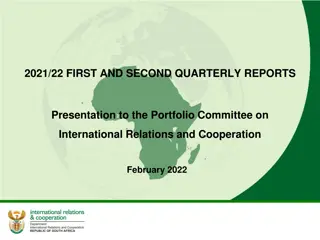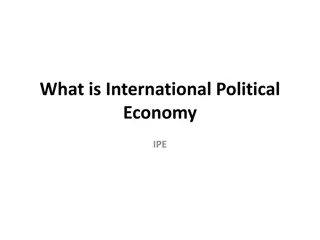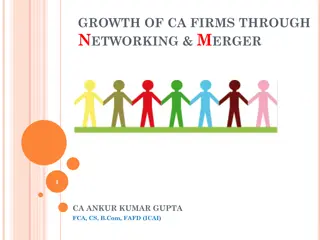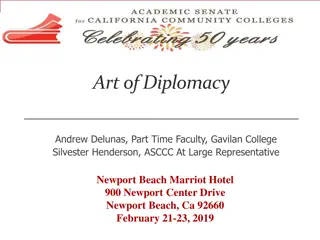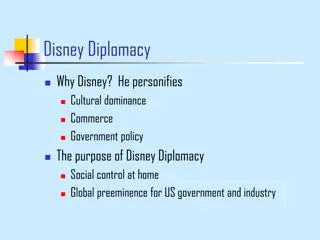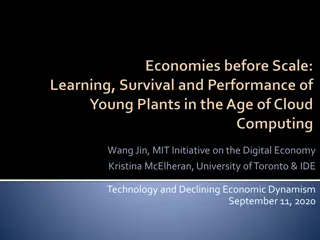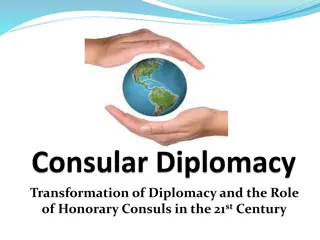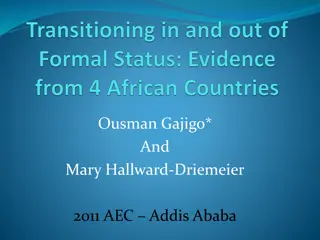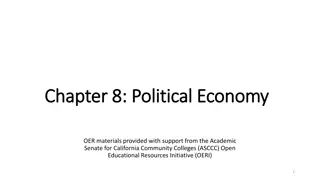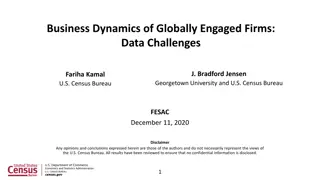International Political Economy - States, Firms and Diplomacy
An in-depth course on the complex interplay between states, firms, and diplomacy in the field of International Political Economy. Delve into the economic relationships, power dynamics, and strategic interactions shaping global governance. Taught by Dr. at TIUTishk International University.
Download Presentation

Please find below an Image/Link to download the presentation.
The content on the website is provided AS IS for your information and personal use only. It may not be sold, licensed, or shared on other websites without obtaining consent from the author.If you encounter any issues during the download, it is possible that the publisher has removed the file from their server.
You are allowed to download the files provided on this website for personal or commercial use, subject to the condition that they are used lawfully. All files are the property of their respective owners.
The content on the website is provided AS IS for your information and personal use only. It may not be sold, licensed, or shared on other websites without obtaining consent from the author.
E N D
Presentation Transcript
TIU Tishk International University FASE IRD Department International Political Economy International Political Economy Code: IRD 306 UNIT - V IPE: STATES, FIRMS AND DIPLOMACY COURSE EDUCATOR: DR. NEVILLE D CUNHA ASSOCIATED PROFESSOR
Unit VIIIPE: States, Firms and Diplomacy - 1 Susan Strong argues that changes in the international economy have altered the relationship between states and MNCs and have given rise to new forms of diplomacy in the international arena. Technological developments, the growing mobility of capital, and the decreasing costs of communication and transportation have led increasing numbers of firms to plan their activities on a global basis.
Unit VIIIPE: States, Firms and Diplomacy - 2 This has increased competition among states as they encourage firms to locate within their territories. The international economic environment within which all states operate has been fundamentally transformed, and governments are being forced to adapt to this new reality. States Firms Diplomacy
Unit VIIIPE: States, Firms and Diplomacy - 3 Structural Change The driving forces of structural change behind the liberation of Central Europe, the disintegration of the former Soviet Union, the intractable payments deficit of the United States, the Japanese surpluses, the rapid rise of the East Asian newly industrialized countries, and the U-turns of many developing country governments from military or authoritarian government to democracy, and from protection and import substitution toward open borders and export promotion.
Unit VIIIPE: States, Firms and Diplomacy - 4 Structural Change These common driving forces of structural change towards open borders and export promotion of technological change which has speeded up in its turn the internationalization of production and the dispersion of manufacturing industry to newly industrialized countries; increased capital mobility, which has made this dispersion of industry easier and speedier; and those changes in the structure of knowledge that have made transnational communications cheap and fast and have raised people s awareness of the potential for material betterment in a market economy. These common roots have resulted at the same time and in many countries, in the demand for democratic government and for the flexibility that is impossible in a command economy.
Unit VIIIPE: States, Firms and Diplomacy 5 Structural Change Besides the accelerating rate of technological change, two other critical developments internationalization of production. One, was the liberalization of international finance, beginning perhaps with the innovation of Eurocurrency by 1960s. Second, Financial deregulation initiated by the United States in the mid-1970s and early 1980s. Third, contributing factor to internationalization has been the steady and cumulative lowering of the real costs of trans- border transport and communication. contributed to the rapid
Unit VIIIPE: States, Firms and Diplomacy 6 Broader Perspectives These structural changes have permeated beyond finance and production to affect global politics at a deep level. They have, for instance, significantly affected North-South relations. In the space of a decade, there has been a striking shift away from policies of import-substitution and protection towards export promotion, liberalization and privatization. In a global economy, there has come greater awareness of what is going on in other countries and of the widening gap between living standards in the affluent West and their own. In the world market economy, competition among producers has lowered costs to consumers and widened their choice of goods while raising their real incomes.
Unit VIIIPE: States, Firms and Diplomacy 7 Two sides of Diplomacy: State-Firm Diplomacy The net result of these structural changes is that there now is greatly intensified competition among states for world market shares. The transnational firm has command of an arsenal of economic weapons that are badly needed by any state wishing to win world market shares. The firm has, first, command of technology; Second, ready access to global sources of capital; Third, ready access to major markets in America, Europe and often Japan.
Unit VIIIPE: States, Firms and Diplomacy 8 Two sides of Diplomacy: State-Firm Diplomacy While the bargaining assets of the firm are specific to the enterprise, the bargaining assets of the state are specific to the territory it rules over. The enterprise can operate in that territory even if it just sells goods or services to people living there only by permission and on the terms laid down by the government. Yet it is the firm that is adding value to the labor, materials and know-how going into the product. States are therefore competing with other states to get the value-added done in their territory and not elsewhere. That is the basis of the bargain.
Unit VIIIPE: States, Firms and Diplomacy 9 Firms as Diplomats The importance of firms as major actors in the world system- will be obvious enough to leaders of finance and industry. They will not need reminding that markets may be moved, governments blown off course and balances of power upset by the big oil firms, by the handful of grain dealers, by major chemical or pharmaceutical makers. It will come as no surprise to them that the game of diplomacy these days have extra new dimensions as well as the conventional one between governments.
Unit VIIIPE: States, Firms and Diplomacy 10 Firms as Diplomats Under the pressures of structural change firms can decide to make strategic or tactical alliance with other firms in their own or a related sector of business. In contrast, in IR it is accepted as normal that states should ally themselves with others while remaining competitors, so that bargaining that takes place between allies is extremely tough about who takes key decisions, how risks are managed and how benefits are shared.
Unit VIIIPE: States, Firms and Diplomacy 11 Firms as Diplomats In the 21stCentury IPE studies, MNCs or transnational corporations should now be put center stage; that their corporate strategies in choosing host countries as partners are already having great influence on the development of the global political economy, and will continue increasingly to do so. The assertion that firms are major actors is at odds with the conventions of international relations. IPE is presently stuck in the study of mercantilism, liberalism and socialism (Marxism).
Unit VIIIPE: States, Firms and Diplomacy 12 Firms as Diplomats In common with many contemporary political economists, our interest is not confined to the behavior of states or the outcomes of states. Who-gets-what questions must also now be asked about social groups, generations, genders, and not least, about firms and the sectors in which they operate.
Unit VIIIPE: States, Firms and Diplomacy 13 Firms as Diplomats It needs recognizing that both types of bargaining are interdependent with developments in state-state bargaining and that this in turn is interdependent with other two forms of transnational diplomacy. Who-gets-what questions must also now be asked about social groups, generations, genders, and not least, about firms and the sectors in which they operate.
Unit VIIIPE: States, Firms and Diplomacy 14 Firms as Diplomats In the discipline of Management studies, corporate diplomacy is becoming at least as important a subject as analysis of individual firms and their corporate strategies for finance, production and marketing. In the study of international relations, an interest in bargaining is already beginning to supplant the still- fashionable analysis of international regimes.
Unit VIIIPE: States, Firms and Diplomacy 15 Summary A focus on bargaining, and the interdependence of the three sides of diplomacy that together constitute transnational bargaining, will necessary prove more flexible and better able to keep up with the change in global structures. No bargain is forever, and this is generally well understood by anyone with hands-on experience of negotiation.
Unit VIIIPE: States, Firms and Diplomacy 16 Summary The political art for government diplomats, is to devise bargains that will hold as long as possible bargains that will not easily be upset by changes that will hold as long as possible, bargains that will not easily be upset by changes in other bargaining relationships. This is true for political coalitions between parties, or between governments and social groups, such as labor; and it is equally true for bargains between governments and foreign firms, and between firms and other firms. The multiplicity of variables in the pattern of any one player s interlocking series of bargains is self-evident.
Unit VIIIPE: States, Firms and Diplomacy 17 Summary Today, the complexity of the factors involved in each of the three forms of transnational bargaining, and the multiplicity of variables at play, incline us to deep skepticism about general theories (understanding). Not only are (political) economics or the (political) economists inseparable from the real world of power and politics, but outcomes in the global political economy, the product of this complex interplay of bargains, are subject to the great divergences that is the hallmark of twenty-first century international political economy.





